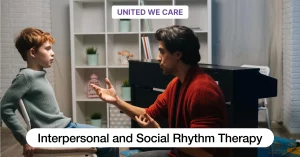Mental illness is a genuine and severe issue that affects millions of people worldwide. Sadly, there are still a lot of stigmas surrounding mental illness, making it difficult for people to seek help. It is one of the reasons why mental health chatbots can be so helpful: they provide a safe and anonymous space for people to discuss their mental health issues and can turn out to be their perfect go-to buddy!
What is a Mental Health Chatbot?
A mental health chatbot is a computer program designed to communicate with people struggling with mental health issues. A mental health chatbot aims to provide support and information to users to help them cope with their mental health problems. You can access these chatbots through various platforms, such as messenger apps, social media platforms, and websites.
Artificial intelligence (A.I.) powers mental health chatbots. This technology allows the chatbot to understand the user’s conversation and respond accordingly. The goal of using A.I. in mental health chatbots is to provide a more human-like experience for the user. It can help make the chatbot feel more like a supportive friend than a machine. Additionally, A.I. allows the chatbot to improve its response over time as it learns more about the user’s needs.
Mental health chatbots interact with their users with the help of audio, video, or text messages. Some chatbots are entirely automated, while some use a human interface too. These computer programs are made close to psychiatrists, psychologists, and counsellors and are based on cognitive behaviour therapy (C.B.T.).
Our Wellness Programs
Mental Health Chatbot Benefits
Mental health chatbot benefits include:
- 24/7 Support: Mental health chatbots can support users any day or night. You do not have to wait for weeks to get an appointment with a mental health care professional.
- Immediate Response: Chatbots can provide a quick response to users, which can be helpful in emergencies. They are equipped to analyse the chats and can identify suicidal thoughts or depression and anxiety requiring attention. If they sense the requirement, they also provide phone numbers of hotlines that the users can avail of to get immediate help.
- Anonymity: Users can remain anonymous when using mental health chatbots, encouraging them to openly discuss their mental health issues. You do not have to worry about getting judged.
- Convenient: Mental health chatbots are convenient as users can access them anywhere. There is no commitment, either. If you do not feel like talking anymore, you can log off the app at any time.
- Easy to use: The design of Mental health chatbots is to be user-friendly and easy to use.
Looking for services related to this subject? Get in touch with these experts today!!
Experts

Neelam Parwani

India
Life Coach
Experience: 5 years

Mansi Chawla

India
Psychologist
Experience: 12 years

Sapna Zarwal

India
Psychologist
Experience: 19 years

Deepti Gandhi

India
Life Coach
Experience: 6 years

Zabby Sharma

India
Life Coach
Experience: 11 years
How can you Use a Mental Health Chatbot?
If you struggle with mental health issues, you may find using a mental health chatbot.
- These chatbots can provide support and information to users to help them cope with their mental health problems.
- To use a mental health chatbot, you will need to download a messenger app or social media platform that offers these services.
- Once you have done this, you can search for mental health chatbots and add them to your contacts list.
- When you want to talk to a chatbot, you can simply send them a message through the app or platform. Some mental health chatbots are also available on websites.
- Several different mental health chatbots are available, each with its unique features and functionality.
- Some of the most widespread mental health chatbots include Wysa, Woebot, and Moodpath.
Mental Health Chatbot Highlights
Mental health chatbots are becoming increasingly popular as they offer a convenient and anonymous way for people to get support for their mental health issues. There is a massive gap between the number of mental healthcare professionals and the number of people who need help and care for their mental health. On top of this, a large population still does not feel at ease consulting a professional for their mental health issues. Mental health chatbots help in bridging this gap as they have the potential to provide support and information to large numbers of people who are struggling with mental health issues.
When you need to talk to someone, all you have to do is send a message to the chatbot through the app or platform. A few mental health chatbots check the user’s mood by sending messages at regular intervals.
Other mental health chatbots can assist you in self-analysing your symptoms and helping you decide if you require professional help.
Wrap Up!
It is miserable that even in today’s modern times, mental health is an issue that is brushed under the carpet for as long as possible instead of seeking immediate professional intervention. Even though the world is on the verge of a mental health epidemic, there has been little public discussion about how to avoid or cure it. Very few actions are being taken on a vast scale to manage the growing number of individuals with mental health issues.
This disproportionately large surge in occurrences contributed to a large extent to the Corona pandemic. The isolation caused by lockdown, worry, and financial uncertainty has induced severe psychological trauma in individuals across the globe. During such trying times, mental health chatbots prove to be an immense help. Mental health chatbots offer 24/7 support and a convenient and anonymous way for people to get approval for their mental health issues. Artificial intelligence (A.I.) powers these chatbots and can provide a human-like experience for the user.
It is, however, essential to note that you should not use chatbots as a substitute for professional help. If you are struggling with mental health issues, please seek help from a qualified professional.
Visit test.unitedwecare.com to learn more about mental health issues and their management.















